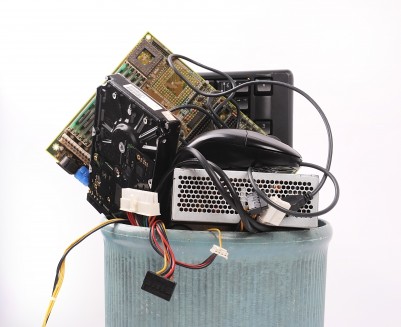You can’t deny it: The strange, overwhelming compulsion to buy the latest gadget the second it hits the market. Advances in computer design and usability have ushered in a boon of technological choices – but what is it costing the Planet?
 Today’s technology presents a very unique consumer conundrum: every product you buy will soon have a thinner, faster, and more intuitive version before you can say “Apple Store.”
Today’s technology presents a very unique consumer conundrum: every product you buy will soon have a thinner, faster, and more intuitive version before you can say “Apple Store.”
In a culture that’s constantly updating and outdating, the average consumer replaces their mobile device every 22 months and desktop computer every two years. While new products enhance user experience and reliability, replacing electronics constantly comes at an epic environmental cost, generating 20 to 50 million metric tons of electronic waste worldwide every year.
%NEWSPAGE_START_TRUNCATE%
From this staggering volume of discarded electronics, only a meager ten to eighteen percent is recycled. Here’s what can happen to the rest:
It ends up in your backyard
Maybe not literally, but the effects of poorly handled electronics hit closer to home than you think. When end-of-life equipment isn’t recycled or disposed of properly, hazardous toxins can seep into groundwater, creating dangerous top-down consequences in our food chain affecting plants, animals, and eventually, humans. (CRT monitors, for instance, contain toxins such as lead, cadmium, and phosphorous, which is why there are fines associated with improper disposal.)
It ends up in someone else’s backyard
Developing countries, such as Pakistan, India, and China, import a large percentage of the electronic waste from the United States because it creates jobs within struggling economies. However, many developing countries don’t adhere to adequate human health and safety regulations, which mean men, women, and children are directly exposed to harmful chemicals when e-waste is deconstructed or incinerated.
It takes up storage space
If you don’t throw it away, it’s not hurting anyone…right? While the “stash it and forget about it” strategy may be well-intended, storing discarded electronics represents a poorly constructed Band-Aid, not an answer. Taking electronics out of the waste stream for storage is a temporary – and often costly – fix to a permanent problem and prolongs the inevitable.
How you can help
In the end, the most responsible way for consumers and businesses to discard used electronics is through a certified electronics recycler. A1 Assets is a certified Responsible Recycling (R2) e-cycler in Central Florida, ensuring that all toxic materials are managed safely and responsibly in every phase of technology lifespan – from creation all the way to final disposition.
Are you looking to dispose of your old electronics in an eco-conscious way? Individuals and businesses are invited to join us February 23 in Orlando Festival Park for a recycling event in conjunction with City of Orlando. We’re accepting computers, monitors, mobile devices, and more. You’ll feel good about getting rid of excess clutter while keeping the earth a greener, cleaner place.
